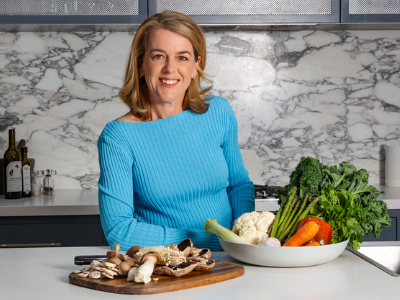
Immune function naturally decreases with age, but researchers have found a simple way for older Australians to help feed their immunity needs.
One of Australia’s leading nutritionist’s Jane Freeman (pictured) says adding the mighty mushroom has been proven to boost intakes of essential nutrients needed to help older immune systems fight off infection.
“Immune health is very topical right now, especially as COVID continues to circulate, and what better time to talk about it as Seniors Week activities begin in New South Wales,” Ms Freeman says.
“While mushrooms are widely known for their great taste and numerous health benefits, mushrooms can help correct inadequate or low vitamin D levels, as one serve of mushrooms can provide up to 100% of an older person’s vitamin D requirements.
"Mushrooms can also serve up potassium, selenium, magnesium and other important antioxidants needed to help with the health needs and risks of those aged in their 60’s and beyond.”
In addition, around 10% of a mushrooms total weight is made up of a powerful antioxidant called Beta-glucan. This is double the amount of b-glucan per serve compared to other well-known food sources that include oats and barley.
According to a new study published in the Journal of Autoimmunity, beta-glucans activate parts of the immune system, and in doing so it increases your body’s ability to fight infection and possibly stop or slow the growth of tumours.
“Eating a serve of mushrooms every-day or including mushrooms into two meals a week is an easy and enjoyable way for older Australians to help keep their immune health in tip-top condition and also help the body’s defence when common viruses or infections strike,” Ms Freeman adds.
"A serve of mushrooms provides antioxidants and vitamin D for a healthy immune system.”
Here are 4 fun facts about mushrooms & immunity:

Did you know that eating 100g of cooked white button mushrooms for seven days may help to support markers of immune function? This is an easy way for older Australians to improve immune system defence when it comes to common viruses or infections.

Eating three cup mushrooms most days that have been ‘tanned’ or exposed to the sun for 15 minutes (this increases vitamin D levels in mushrooms) is able to partially correct low or deficient vitamin D levels.

Mushrooms can help to feed the immune system function. It’s important to eat the stalk and not peel mushrooms as this is where most of the beta-glucan is found.

Mushrooms contain good sources of a number of the vital nutrients that can help to improve bone and muscle strength, cognitive health, and reduce risks around respiratory infections. Around 10% of a mushrooms total weight is made up of a powerful antioxidant called Beta-glucan. This is double the amount of b-glucan per serve compared to other well-known food sources that include oats and barley.
AMGA Dietitian - Jane Freeman
Jane is an internationally regarded and experienced dietitian and nutritionist, is an IOC (International Olympic Committee) qualified sports nutritionist, Leiths qualified cook and an award-winning author.
As a practicing dietitian and director for CANutriton, a cancer specialist nutrition practice in Sydney, Jane is big mushroom lover and passionate about delivering practical nutrition advice that is easy to understand and adopt.
Join our Mushroom Lovers Club!
Receive delicious Mushroom recipies and much more.

